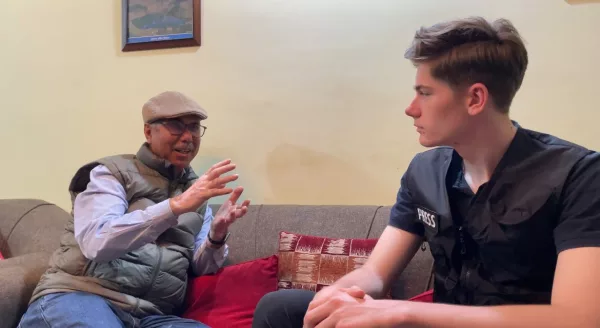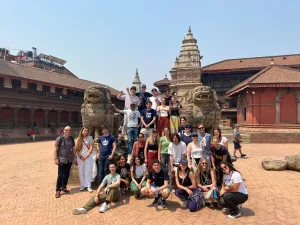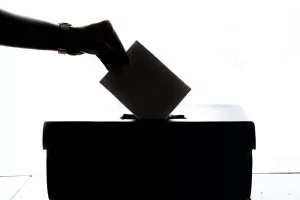“We do investigative journalism on different political groups and niche rebel movements.”
The Modern Insurgent (TMI) is a digital magazine about insurgencies, rebel groups, and political rebellions around the world. It was founded in 2022 by Antoine Brimbal, a second-year International Relations student. Just within a few months of its existence it has attained over 6k followers on Instagram, over 950 blog subscribers, and is currently working on releasing documentaries. This innovative journal, touching on controversial topics from a non-biased position, has only been experiencing growth– now being a group of 40 volunteers. As News Editor, I was very pleased to represent The Stork with an interview with Antoine:
Why did you decide to start TMI?
“I was one of the main witnesses of the Vienna terrorist attack in 2020. This event really marked me and became one of the main inspirations to start this blog. After the tragedy, I wanted to join the military to help end terrorism; but my father (who was in the army) discouraged me from this route by ensuring me that there were better things I could do. This is the reason why I decided to step it up and try to fight it [terrorism] by spreading information that not a lot of people know about.”
What differentiates your content from other platforms?
“What makes us stand out is that we use ‘open-source intelligence’. Instead of researching solely on academic websites and scholarly articles, we infiltrate the social media networks of these insurgents in order to find first-hand, primary information that is difficult to get otherwise. Some people just don’t know how to obtain this information or are not willing to. Because of this, we have received certain commissions in the past from The Popular Front– a big news outlet focused on investigative journalism – to help them by creating research portfolios of groups that are very hard to find information about.”
What are some of the difficulties of the research process? Have your writers ever been stuck because of a lack of information?
“There are two ways in which our content gets blocked sometimes. One is because of a lack of information. Sometimes we cannot find anything new about these groups; that is to say, something that is not already known in the common media. What we have done in the past to overcome that, is to find a member of the organization and reach out to them. Hence, we have had interviews with insurgents and terrorists.”
“The second way we get blocked in terms of content is when members of the group are very suspicious of what we do and refuse to collaborate. This skepticism occurs very often because they either think that we are typical journalists or intelligence forces of a country. Usually, we just have to work on building their trust.”

Does it sometimes get scary working on this topic?
“There are some instances that are quite frightening while we are doing our research. When we infiltrate the channels of certain political groups, the things we see are pretty crazy, especially when it comes to far-right groups. That being said, with open source intelligence, the information that is so unique is only obtained because we are willing to process these contents. As independent researchers, and given that it is our entire goal, we have to analyze ‘atrocious’ videos and try to surmount our fears. Even though we have a resistance to gory content, it doesn’t mean that we have no emotions. I still have a problem with this, but it is important to have the ability to think clearly and not be overwhelmed by what is happening. Interestingly enough, sometimes the frightening things are what make people enjoy our articles.”
Have you ever been threatened for releasing information on the insurgencies?
“Not necessarily. Most of the time, we receive positive feedback from the group members because they are grateful for us showing what they are fighting for. Also, during the editing process, we always try to make sure that there is no bias. Hence, our articles are neutral– just analytical. We never side with a group or denounce the actions of a group.”
How has the project grown so far?
“The first 4-5 months of TMI consisted of an Instagram page with only me working on it. Then, once I reached 3k followers, I decided that the project had to become more concrete. So I took the time during the summer to make a website, YouTube channel, and opened a call to volunteers. During the first wave of recruitment, we acquired 18 people and have been gradually increasing ever since.”
“It is impressive to see how something that just developed from me, after a couple of months, managed to become a whole network of 40 people from over 24 different nationalities.”
“I would say that 70% of my work every day is taking care of TMI. Growing the project and organizing the team from the ground up is challenging, but it is an amazing challenge. There is no better feeling than seeing this whole entire project that I developed by myself continue growing and becoming more credible by the day. Another challenge would be the difficulty of the things we do. Open-source intelligence research is very time-consuming and takes skill. It is a big challenge, but it is a big pleasure as well.”

During your interview in the ‘Just Checking In Podcast’ (JCIP), you expressed your desire for the next step of TMI to be documentaries. Recently, you created the first one in Nepal. How did this occur?
“Documentaries nowadays are very important since people prefer visual content over reading, so the next step for TMI was to get on the field and produce a documentary. I had the opportunity to go to Nepal for the IE Transformational Journey. At the end of the trip we had 3 free days in Katmandu which I had planned months prior and used to meet with former and current leaders of the Maoist Party – the communist party in Nepal – and a journalist, and we filmed a lot of interviews with them. In addition, I went around Nepal to show how the insurgency between 1996 and 2006 influenced today’s politics in Nepal. The reason why I liked this project so much is that it is quite a niche topic, which captures the essence of TMI. We went somewhere quite underreported and showed what was actually happening. Furthermore, we have an upcoming documentary planned in northern Ireland. Some of our writers will be going to Belfast to film with the Continuity IRA – the last paramilitary group in Ireland.”
When talking about the future, Antoine expressed his desire to become a conflict journalist. Which is one of the reasons why he is very passionate about this project. The Modern Insurgent has seen a lot of growth, “we are diversifying our outlets with interviews, documentaries, and soon enough a podcast.” All in all, it’s a project that holds a lot of prospects and potential.







